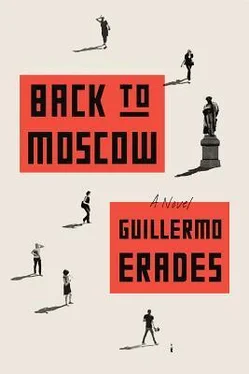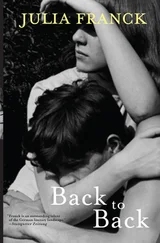‘Martin, you are a very slow reader,’ she said once, while we were drinking tea and discussing Gogol in her office. She had a point, I thought, as I reclined cautiously on the wobbly chair, careful not to spill any tea. I had read some of the articles she’d recommended. Three, perhaps two, from a list of twelve. I told her it was hard for me to read faster, as most of the articles were in Russian. This was not entirely untrue.
On another occasion, Lyudmila Aleksandrovna mentioned how this other research student she was supervising, a Pole or a Czech, was making so much progress. ‘He is so dedicated, such a hard worker,’ she said.
It was true that, as things turned out, I was dedicating less time to my research than I’d initially intended. Not that I didn’t appreciate the intellectual stimulation of academic life, or Lyudmila Aleksandrovna’s mentorship. It was simply a question of scheduling. Free time was scarce in Moscow — my weeks came with a number of fixed appointments. Tuesday night was of course ladies’ night at the Duck. Wednesday night we were expected to attend the Moscow-famous Count down at the Boarhouse, where, if you arrived early enough, you could get up to four drinks for the price of one. Thursday night was Propaganda night. Unmissable. And then, come the weekend, we had new clubs to explore, but also the old ones, which we still had to keep up with: McCoy, Karma, Dirty Dancing, Beefeater, Papa Johns.
One day Lyudmila Aleksandrovna handed me a reading list on Lermontov, which we were supposed to discuss at our next meeting. A week later I showed up in her office apologising for not having read the articles.
‘But these articles were mostly in English,’ she said, gazing at me from behind her thick glasses. ‘You shouldn’t have any problem reading them.’
‘I know,’ I replied. ‘I just didn’t have much time this week.’
‘Don’t worry, Martin, go back to the library right now and come back tomorrow.’
She was pissed off.
I decided not to go out that night and focus on Lermontov instead. After dinner, I sat in my room trying to read the articles, a selection of texts about the sociological and historical context of A Hero of Our Time . The articles were interesting but I found it hard to concentrate. As I lay on my bed, taking a break from the reading, trying to focus on Mikhail Yuryevich’s life and times, my head kept flashing up images of Propaganda. The dance floor, the chilled vodka, the pretty dyevs. It was Thursday night and, by now, the brothers were probably getting into the club. I thought about the night I met Lena, when we left Propaganda and she took me to the rooftop to show me the view. I recalled how, at some point, I put my arm around Lena, and, before we kissed for the first time, I had to listen to a long exposition on the importance of meditation and yoga in her life.
Back at my desk, I tried to channel my thoughts from Propaganda back to Lermontov and the articles I had spread in front of me. But my mind rebelled, fought back and drifted to Propaganda.
What was the point of coming all the way to Moscow if I was going to stay in my room reading articles?
I began to think about the ultimate purpose of my academic work. When I’d first discussed my research with Lyudmila Aleksandrovna, she’d suggested that I also use non-literary sources. ‘If you are going to study the female characters in Russian literature,’ she’d said in our second meeting, ‘you could start by analysing the situation of women in Russia.’ She then suggested that I read demographic studies, opinion polls, media analyses, and use all this scientific data to extract a clear picture of the role of women in Russian society. ‘This could help you understand the real-life context in which literary heroines are born,’ she’d said.
I could certainly check those sources, I now thought. In fact, if Lyudmila Aleksandrovna’s point was that I form a clear picture of Russian women, I might as well adopt a more direct approach. I could add, for instance, a primary source of qualitative data. It then occurred to me that meeting dyevs could well be considered, to some extent, part of my academic research.
I stood up and began pacing around the small dusty room, contemplating the possibility of leaving Lermontov aside for the night and joining the brothers in Propaganda. From an academic point of view, I told myself, it would be interesting to discern to what extent Pushkin, Lermontov, Gogol, Turgenev, Tolstoy, Dostoyevsky, Chekhov — the whole bunch, really — were describing Russian women as they were in real life, and to what extent they were describing their own ideas about Russian women. The more dyevs I met, I told myself, the better I would understand the defining characteristics of real Russian women.
Thrilled with my breakthrough, I took a quick shower, put on a black shirt and a thick coat, and headed for the street. In the taxi I continued to think about my research. I was aware, of course, that my new methodology brought with it some technical difficulties. To begin with, I could anticipate a high degree of cross-contamination between the two populations of my study: heroines from Russian books and women from Moscow’s nightlife. While it was surely real women who had inspired the heroines of the Russian literary canon, the opposite was also true: Tatyana Larina, Anna Karenina, Natalya Rostova, they had all influenced the way Russian women saw themselves.
I paid the taxi fare and strode towards the queue outside Propaganda. I needed to start meeting dyevs in a more structured way. I needed to learn about their lives, their ambitions, their fears. In a later stage of my research I could merge the qualitative data obtained from these encounters with the quantitative data I could gather from scientific sources, such as sociological studies. That would give me a complete picture of Russian women that I could compare with the behaviour of heroines in Russian literature.
Of course, at this stage, I didn’t need to share these details of my research with Lyudmila Aleksandrovna, I told myself as I walked past the bouncer and entered Propaganda — it would be my own methodology, my unique approach, my very personal path into the core of the Mysterious Russian Soul.
AN INITIAL MISTAKE I made was not taking notes on my encounters. This caused me a great deal of confusion. Dyevs had diverse and interesting stories and I could at first identify some Tatyanas and Kareninas, but soon their backgrounds began to merge into one single narrative in my head and my many meetings turned into a continuous conversation with a changing interlocutor.
I often found myself in the awkward position of asking a dyev about a friend or a job she’d never had. When I noticed their confusion, I blamed my faux pas on my poor Russian. They seemed happy to correct me but, to avoid further embarrassment, I began to carry notebooks so that I could keep track of my meetings. Now, on long metro journeys, or sitting alone in cafés, I would take one of the red notebooks I’d purchased at the university, and I would scribble thoughts and bits from my conversations. With time, these notes — my field observations, so to speak — became particularly useful, as they allowed me not only to quickly recall the background of each girl I met, but also to identify common features of the Russian woman, the kind of information that could become handy at a later stage of my research.
I also wrote down the new words and phrases I encountered. Thanks to my regular meetings, my vocabulary was being expanded by intriguing concepts, such as sudba, a word that was used often, meaning fate or destiny, but in a distinctively Russian way. Events in life, I learned, were either ne sudba, when they didn’t happen and therefore were not meant to be, or sudba, which implied a supernatural predestination against which simple human will was powerless. Once I understood the importance of this concept, I tried to use it as much as I could. And so I often found myself walking along the Old Arbat or sitting in a café, holding a girl’s hand and telling her how I thought our meeting had been such a huge sudba. They liked that.
Читать дальше












